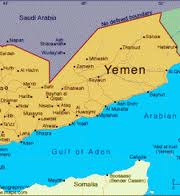The Following piece is written by a Yemeni-based journalist who writes for Foreign Policy Association (FPA) and, due to serious security concerns, remains anonymous.
 With Yemen entering its fourth month of protests and scores of casualties (reportedly 140 dead), the country is nowhere nearer a solution. So far it seems that all political negotiations have failed miserably after Saleh’s refusal to sign the GCC agreement, which granted him immunity from future prosecution.
With Yemen entering its fourth month of protests and scores of casualties (reportedly 140 dead), the country is nowhere nearer a solution. So far it seems that all political negotiations have failed miserably after Saleh’s refusal to sign the GCC agreement, which granted him immunity from future prosecution.
Yemen, which according to many was already a “failed state” is now being engulfed in a multi-facet crisis. Its government in tatters, no legally able Parliament, a shortage in liquidities and its economy brought to a halt, Yemen’s oxygen supply is running low. Meanwhile, the Army and Security Forces are relentlessly targeting protesters, causing more misery to the region’s poorest nation. Despite all this, Yemenis seem bent on one thing only: Saleh’s immediate removal from power and departure.
The Government Attacks, Protesters Push Back
Despite entering another month of protests, the Revolutionary momentum is still on the rise. Last Friday gatherings were the biggest so far and protesters have sworn that they will stay even if it means waiting for 2013, the official date of the next presidential elections according to the regime.
And if the President was betting on wearing out the Youth Movement by gaining some time, he miscalculated the extent of their resilience. Because if Saleh is himself about to lose everything, an entire generation has nothing left to lose; decades of repression and poverty have stripped them of any hope for the future. The only light for them is now the removal of the regime, and they are willing to pay the ultimate price if they have to.
In Abyan, there are reports of Sheikhs organizing a tribal army to defeat the Republican Guards. Some witnesses are saying that the tribesmen have now surrounded the military base and have started their assault. If this move happens to be successful, it might give a new direction to the uprising.
In Taiz, the country’s second largest city, a teacher’s march ended up costing the life of one participant, Khaldon Rashed Al-Absi, shot dead in the hands of Republican Guards. But despite the crackdown and countless arrests in its wake, the protesters are continuously gaining more ground.
A Shift in Direction
After many negotiations between the Opposition and the Regime, two failed GCC proposals, and the disinterest of the international community, the Youth Movement is taking its power back.
If protesters were willing a few weeks ago to allow the political factions to make a go at solving the crisis, they are adamant now that the answers to Yemen’s ailments lay in their hands. A statement was actually issued today, demanding the withdrawal of the latest GCC attempt at mending bridges with Ali Abdullah Saleh.
The Revolution wants to move away from the old political guard, they want to start afresh, unburdened by the past.
Rumors are circulating in and around the Freedom Square that Saleh is arming his supporters, wanting to ignite an armed conflict; hoping it would give him the upper hand. Despite their desire for a peaceful resolution, the youth have come to realize that they might have to fight after all. In a country where grenades and machine guns are often found mingling with jumpers and sacks of potatoes, it is definitely not a move in the right direction.
Shortage, shortage, shortage
Before the uprising began, Yemen was cash strapped as its oil revenues were dwindling. The country is entirely reliant on the oil industry for its cash supply and the halt in activities has brought the country to its knees. Most government employees, with the exception of Army, were not paid last month, leaving hundreds of thousands of families in a very difficult financial situation. On top of that, many big companies had to lay off most of their staff in order to weather the economic downturn and many small businesses are on the brink of bankruptcy.
As if it was not enough, the country is running out of diesel and the price of cooking gas has more than quadrupled due to severe penury of supply. Many Yemenis have to queue for hours to fill up their car tanks now that gasoline is becoming rarer than gold itself.
Some are accusing the government of self sabotage to prove that only under Saleh’s rule could things work properly and improve. Whether or not these allegations are true, they cannot take away the fact that the country is about to disintegrate. Some organizations within Yemen are also warning against a brewing food shortage that could lead to a humanitarian crisis of biblical proportions.
Chain Reaction
If one could ever define a failed state, Yemen could soon become the perfect case study. Given country’s proximity to another failed state, Ethiopia, one cannot deny the dangerous repercussions this could have for the broader region. We are talking about a breeding, walking ground for all sorts of unsavory groups or “political” parties.
Another element which should be a source of concern for the US is the fact that some protesters in Yemen are beginning to manifest anti-Americanism sentiments. Many feel abandoned by Obama’s administration and seem convinced of its support for Saleh. If this is translated to the next government’s foreign policy, it could lead to Yemen seeking alliances with some anti-American states in the region, an act that would be frowned upon in the United States.